Substack Essay Series #4: The Strange Story of Me, Shia LaBeouf, and the War Between Old Media and New Media (Part IV)
For reasons I still don't understand, Columbia Journalism Review recently published a passel of lies about me and LaBeouf. In this personal essay, I set the record straight.
{Note: This is the final part, Part IV, of a multi-part essay on the ongoing debate between major media and independent journalists working on Substack about whether the former is confirmably more reliable. Part I is here, Part II is here, Part III is here; and a coda is here.}
CJR (Part 4)
American news-readers are not entirely wrong to feel as though dishonest journalists are a dime a dozen these days. Still worse, when such folks are coddled by major-media watchdogs like Columbia Journalism Review—which should have known better than to contract with Lyz Lenz after she was fired by the Cedar Rapids Gazette; Lenz’s bizarre behavior online since has included cackling about getting an interview subject fired on the Book Fight podcast—they continue to do the things they’ve always done that put their employers in bad spots.
For the Gazette, it was the collapse of its coverage of the 2020 presidential election, as previously discussed in this essay series. For Columbia University and Lenz herself, it may well be a highly public and expensive defamation lawsuit. While this prospect gives me no joy whatsoever, I cheer myself by telling myself I did everything I possibly could to help CJR avoid this situation—in fact, far more than anyone who’s followed this story on social media or elsewhere would ever know.
Because I knew, when Lenz first contacted me for an interview in November 2020, that her “set” within the creative writing community had been at odds with me for years (she works at The Rumpus, a publication whose poetry editor, Brian K. Spears, has been trollishly obsessed with me on Twitter for over a decade now); and because I knew she had previously liked a tweet that accused me of being “not credible at all”; I told my agent, when he told me about Lenz’s request for an interview, that the interview was a trap—a set-up for a hitpiece. I wrote Lenz and declined her interview, hoping it would scuttle the piece (you’ll recall she told my agent that the piece was only something she was considering).
It turned out the interview was happening one way or another, as Lenz informed me. I thereafter wrote a letter to CJR Managing Editor Betsy Morais asking CJR to assign a different writer for the interview—outlining my history with Lenz, who indeed I had blocked on Twitter long ago—and I received no response whatsoever. This should have been enough of a clue that CJR did not conform to core journalistic standards, but I nevertheless naively entered into an off-the-record conversation with Lenz about her bias toward me.
With all this in mind, there remains some confusion about how this CJR interview came about in the first place. Lenz told me over email that she suggested my name to CJR, but after my accusations that she had a longstanding animus toward me, she changed her story entirely, and told the Book Fight podcast that in fact CJR had raised my name first. The one thing that soon became clear was that while my participation in the interview was optional, the fact of the hit-piece itself most certainly wasn’t. It was going to be written one way or another; it was not merely being considered. For that reason, I agreed (after a lengthy back-and-forth in which Lenz repeatedly assured me she had no animus toward me, a ruse she dropped the moment her article was published, crowing on Twitter that I’d been “bananas” for years) to speak with her.
It was a mistake to think that speaking to a reporter who’d already pitched her article as a hit-piece would change anything. Indeed, in her Book Fight interview Lenz agreed that I was stupid to speak with her, as the takedown series she’d been publishing at CJR—side note: no one knows why CJR is publishing a series of hit-pieces on people in media, given its stated mission—should have warned me that nothing good could come of it. I cop to idealism and gross naiveté on this score.
What I didn’t know was how deceitful Lenz had been or would be, or that CJR had no fact-checking mechanism whatsoever to issue corrections even when it knew—from hard evidence in its possession—that it had published statements that were false. And I certainly didn’t know that a piece so obviously non-journalistic (indeed not, as it had declared itself, a “report” but a fact-indifferent editorial) would thereafter be amplified by such luminaries as Maggie Haberman of the New York Times and Daniel Dale and Brian Stelter of CNN, let alone one of the self-appointed gurus of major-media ethics on Twitter, Professor Jay Rosen of NYU. I didn’t know that Melville House would cite CJR’s essay in declining, at the last moment, to publish the next edition of the annual literary anthology that had once (briefly) sought to honor Shia LaBeouf’s Twitter feed.
Chris Cuomo
I won’t rehash here the more than two dozen lies in Lenz’s CJR article, as I’ve already posted a lengthy thread on that subject on Twitter—and the old adage about wrestling with pigs (don’t do it, as all that happens is that you get dirty and the pig enjoys it) certainly applies here. CJR cares only about the number of clicks it gets for its article, not whether any part of the article is accurate or whether Columbia University is now facing a potential defamation lawsuit.
But I do want to say this: the most upsetting and indeed traumatizing aspect of having a hit-piece written about you that’s entirely false (as opposed to one based merely on someone’s opinion, which I don’t mind at all, whatever the opinion may be) is when major media participates in the hit not because the hit is honest but because it wants you gone from journalism altogether.
Even worse? When it wants you gone because it knows you have information about it that would be embarrassing. Then it wants you gone and—as many a clichéd movie poster has declared—“this time it’s personal.”
I must say, candidly, that I feel like that’s what happened with Chris Cuomo of CNN, who is mentioned in Lenz’s defamatory hit-piece. And it hurts, in part because I once admired Cuomo, and in part because I spent a year as a regular guest on CNN, during which time both producers and an executive VP at the network lauded my work.
You can head over to my YouTube channel to see some of my CNN clips.
In short, I went through a period in which I did a lot of free work for major media—even suffered through getting interviews MSNBC had solicited me to do cancelled a dozen times—and I didn’t think major media would turn around and do me like this.
As I said: I was naive and, in this respect, got what I deserved. I believed major media was the place of integrity, standards, and rigorous fact-checking Sarah Roberts says it is (see Part I), and it took me years trying to do good work for folks who didn’t deserve my time for me to learn better. One of those people I dedicated time to was Cuomo, and he didn’t deserve it, either—which I suppose I must thank Lenz for teaching me.
Cuomo first contacted me, out of the blue, on Twitter in April of 2018:
It was a pleasant surprise, as I was fond of Cuomo’s work on CNN. I responded in what I think was a modest way, acknowledging that cable news programs need to find a “fit” between analyst and program topic for a booking to make sense:
The compliment was nice, I admit it. I don’t much like dealing with celebrities, but I suspect I’m as susceptible to being complimented by a celebrity as anyone. Indeed, if CNN had never put out a statement to CJR—via an anonymous source at CNN, no less—insisting that I had “absolutely not” been in touch with anyone at Cuomo’s CNN program (including Cuomo), I wouldn’t be airing these conversations. As it stands, I must.
My next contact with Cuomo was in November 2018, and candidly wasn’t really by choice: my publisher at the time, Simon & Schuster, was pushing me to get on-camera on a major media outlet to promote Proof of Collusion, and while normally I don’t like to ask people for things, Jim Sciutto asking me for a copy of my book (as well as my many free appearances on-air at CNN) made me feel like proposing a spot on Cuomo’s show, given his prior statements to me, wasn’t out of line. Thus, this odd exchange:
This “exchange” is odd because, as you can see, it’s not really an exchange at all. I wrote Cuomo around Thanksgiving in 2018, and he wrote me back 120 days later with an unexplained complaint about his treatment by unnamed critics. I nevertheless tried to be comforting:
Did I think he sounded like a crybaby? Sure—but I also knew that I was in no position to judge, as despite having been enormously fortunate with my Twitter feed finding an audience whose size I never could have anticipated, I too fall into bouts of ridiculous self-pity. So I wasn’t entitled to “tsk” Chris for his, even if his level of success in the field of journalism (in every way one determines success) exceeded mine exponentially. You can see some of my self-pity in my response to Cuomo opining that, unlike him, Rachel Maddow had “protection” from sources inside the nation’s media apparatus:
As the author of a forthcoming book on citizen journalism, did Cuomo repeating the old canard that we’re “all citizen journalists” disappoint me? Sure. But I know how academics get—we respond too heatedly to people not knowing as intimately as we do topics we’ve been studying for years—so I didn’t have much of a reaction to his (as I considered it at the time) slip-up.
Then, in October of 2019, things got interesting:
I can’t even screenshot my response, as it’d break Substack’s memory limit for posts. In short, I sent Cuomo the best research from my 2019 New York Times-bestselling book Proof of Conspiracy across thirteen direct messages, some of them so long they broke Twitter’s word limit for direct messages and had to be parceled into multiple DMs. I sent Cuomo links to articles, names and dates of key events, and analyses from a guy (me) who’d published a national bestseller on the very subject Cuomo was asking about—all of it time-consuming and, importantly, free. I didn’t want anything in return; I just wanted to help out. Here’s the last DM of the thirteen I sent Cuomo that day:
I felt good. Chris Cuomo, who I admired, had asked me for help; I’d provided it; he’d acknowledged my help. But it was what came next that was most gratifying. Three days later, after I’d sent Cuomo a relevant article by Natasha Bertrand, this happened:
I wrote back “Sure, sounds good”, and didn’t write Chris again for a month and a half. In late November 2019, I became frustrated that major media was failing to distinguish between four distinct conspiracy theories Trump and his allies in Russia were pushing about the 2016 and 2020 presidential elections. I sent Cuomo three of my threads. This screenshot (which includes the last of my DMs to him) lets you know what happened:
It was a great moment. I’d turned on Cuomo’s show on CNN and seen him outlining the four discrete conspiracy theories Team Trump was pushing, and in exactly the terms that I’d written about them in the threads I sent to CNN. I felt good—like my research for my next national bestseller, 2020’s Proof of Corruption, was getting into major media (in primetime, no less) in a way that would help Americans understand what was going on.
Then, in February 2021, came the hammer—Lenz’s article. Which said the following: “[Abramson] claimed…that he’d advised Cuomo Prime Time, Chris Cuomo’s CNN show…..A CNN source replied, “Absolutely not.”
I was devastated. First, by the false denial from a cable news network I’d done good work for publicly for over a year, and backchannel, on two occasions, during the 18 months thereafter; second, by the fact that whoever CJR spoke to at CNN wasn’t even willing to give their name in falsely denying my contact with Cuomo. {Note: I told Lenz my contact was with Cuomo, so I don’t know why her piece mentions the program; this causes me concern that the anonymous source Lenz used was Cuomo himself, and that he was granted anonymity by Lenz in a situation it was journalistically inappropriate because he’s a celebrity.}
When I showed CJR the proof that I’d been in a long-term discussion with Cuomo about the content on his show, they told me—in prettier terms—to go fuck myself.
I wish I could say that this was the only lesson I learned about the deceitfulness of major media from Lyz Lenz and CJR. It wasn’t. Lenz’s coverage of my interactions with Josh Meyer of Politico was just as dishonest. Meyer and I first spoke by phone, at his request, in November 2017. He’d just sent me this startling email:
This was pretty heady stuff for a Politico admirer. The top investigator at the media outlet called himself a “big fan” and said I do “great investigative work”? That was exciting. On the call, Meyer started the conversation with words that so etched themselves in my memory that after Politico denied knowing me for the first time, in 2018, I typed them from memory into a tweet: “You’re one hell of an investigative journalist.”
That was pretty cool, even if I first revealed it publicly only after the media outlet denied having any idea who I was. In fact, not only did Politico know who I was, they wanted our conversations to remain secret even as they sent me emails asking for “help!” with their reporting:
Like a boyfriend or girlfriend who’s abusing you, they demanded I keep their secret:
Politico asked for my aid so many times in the final weeks of 2017 that I’d again break Substack’s memory limit if I posted screenshots of all of them. The point is that I sent some of them to CJR, offered to send all of them, and CJR again told me—in slightly prettier language (but only slightly)—to go fuck myself.
Here’s the lesson, all: for a variety of reasons that I’m writing a book about right now—reasons that have nothing to do with those offered by the American far right—it is the case that we can’t trust many in major media these days. So find yourself journalists who don’t lie, who keep receipts, who demonstrate integrity even when it’s hard to do so, and then follow them on Substack.
Because that’s probably where they are.
{Note: There’s a link to a coda to this multi-part essay atop this article.}






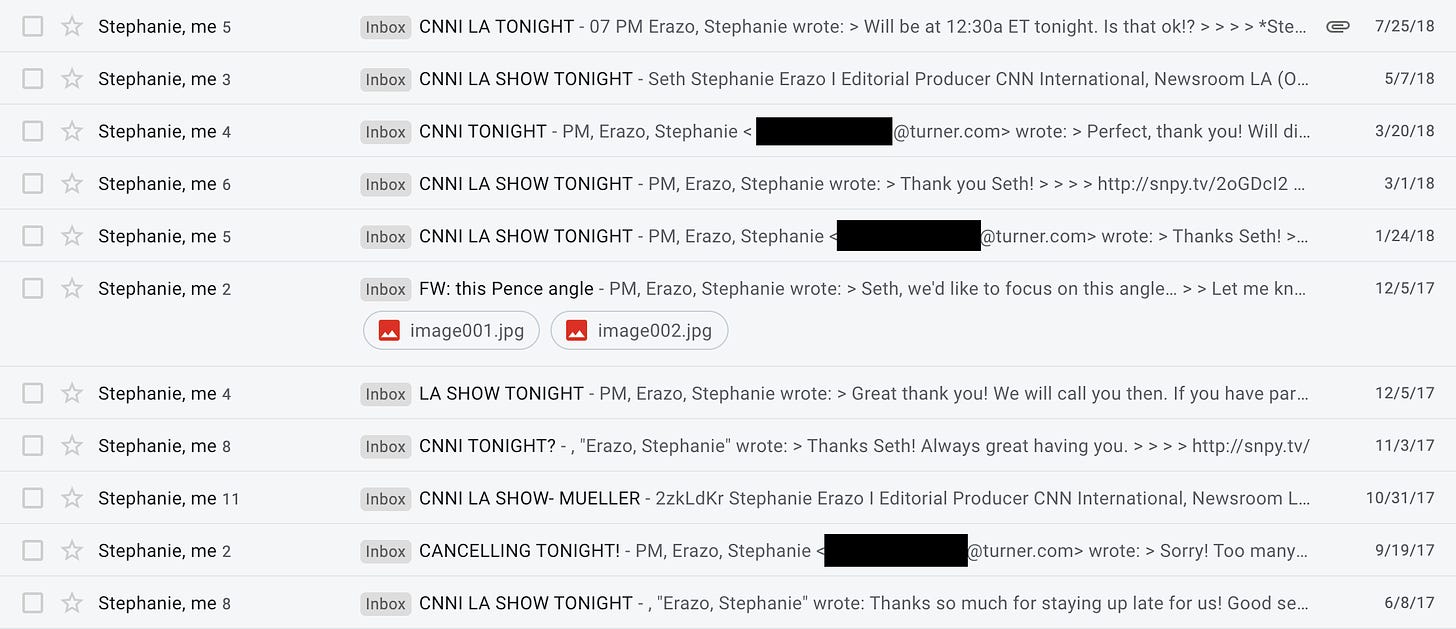
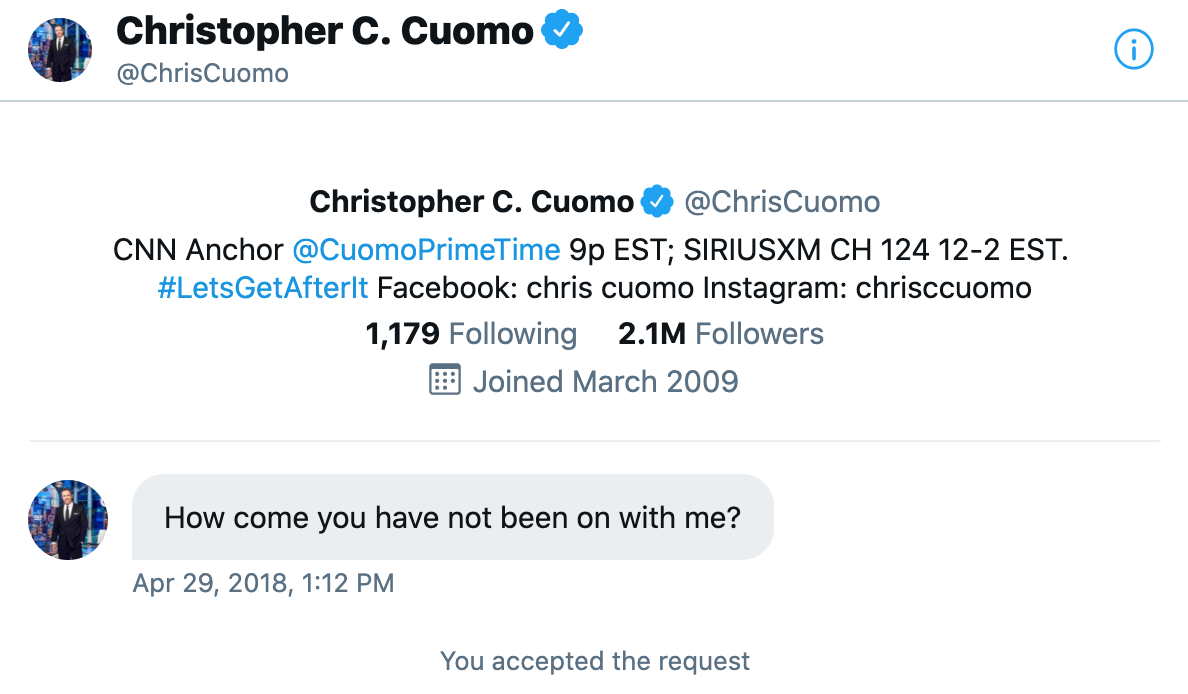
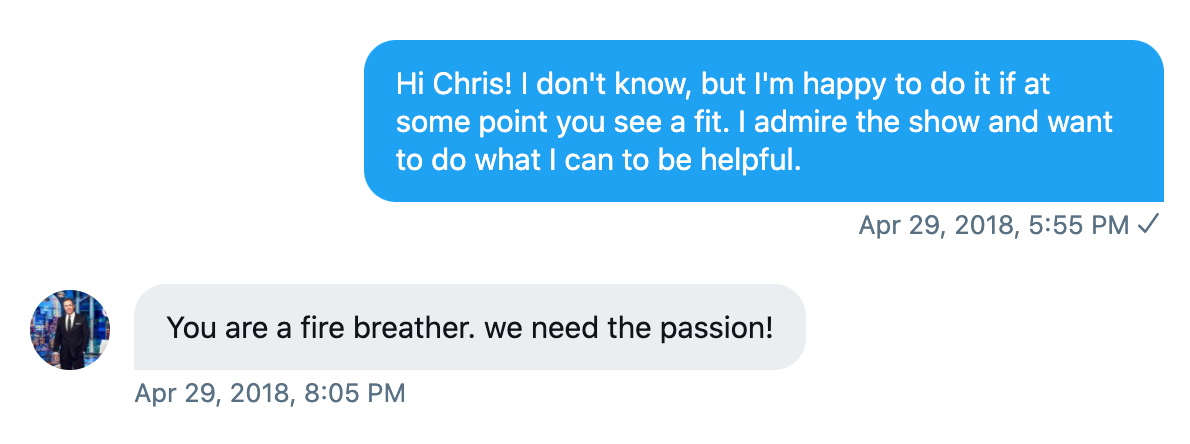
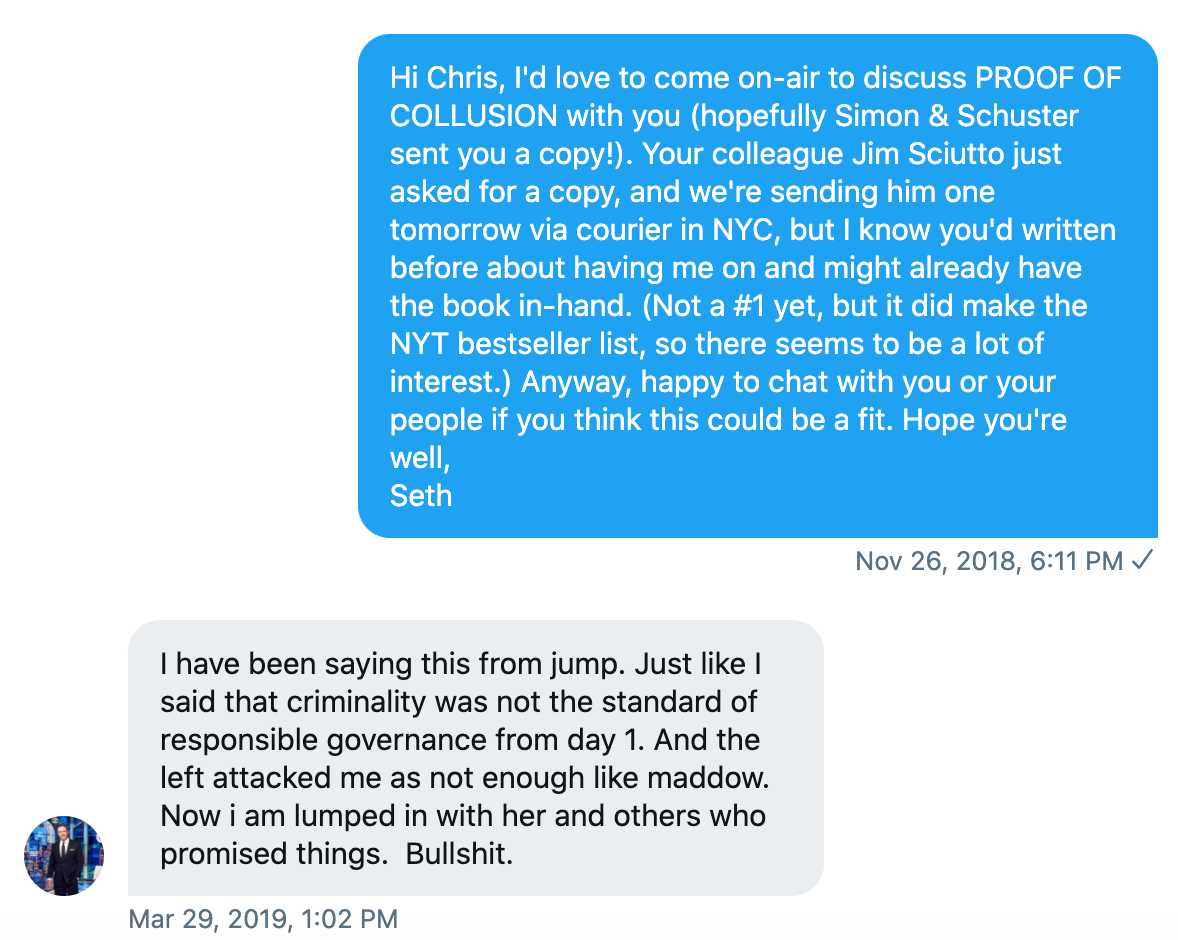

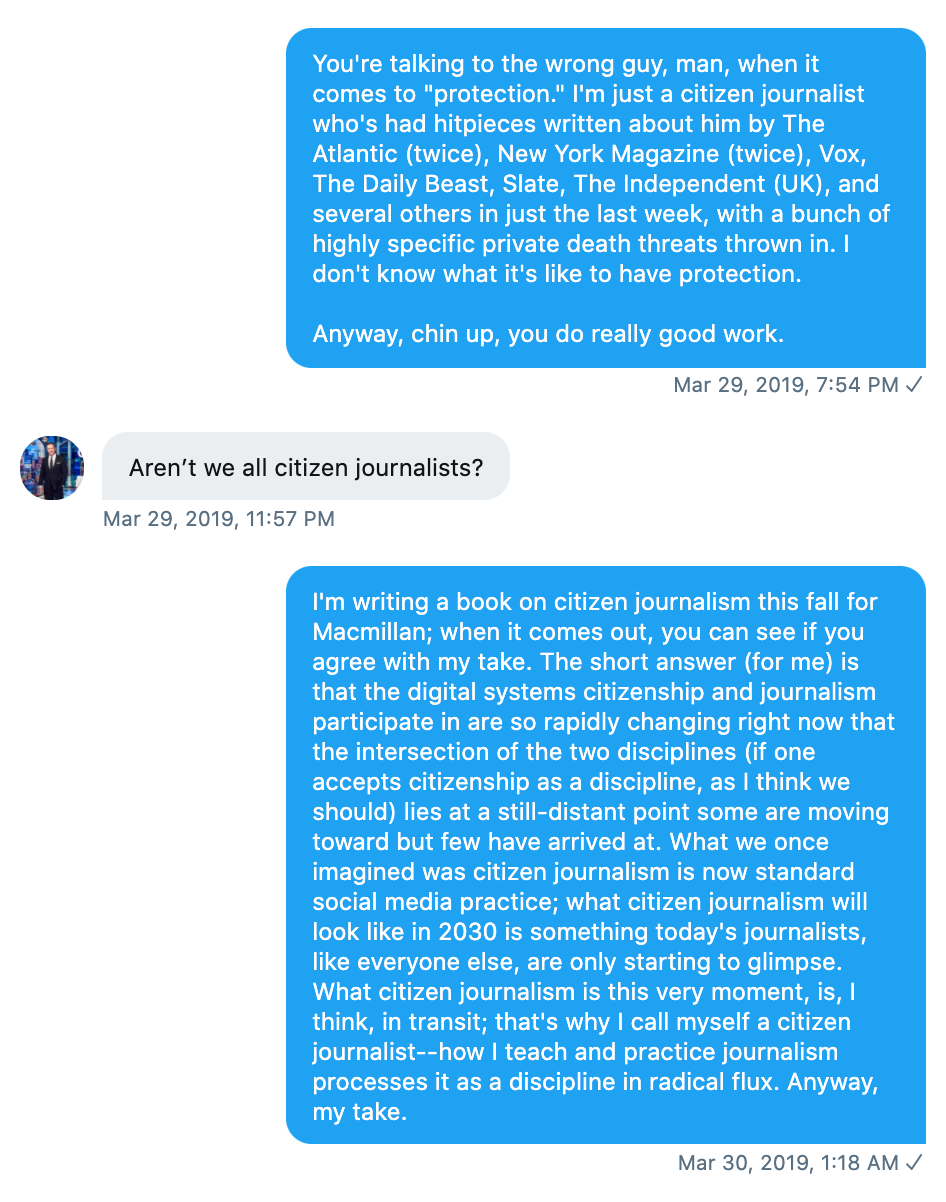

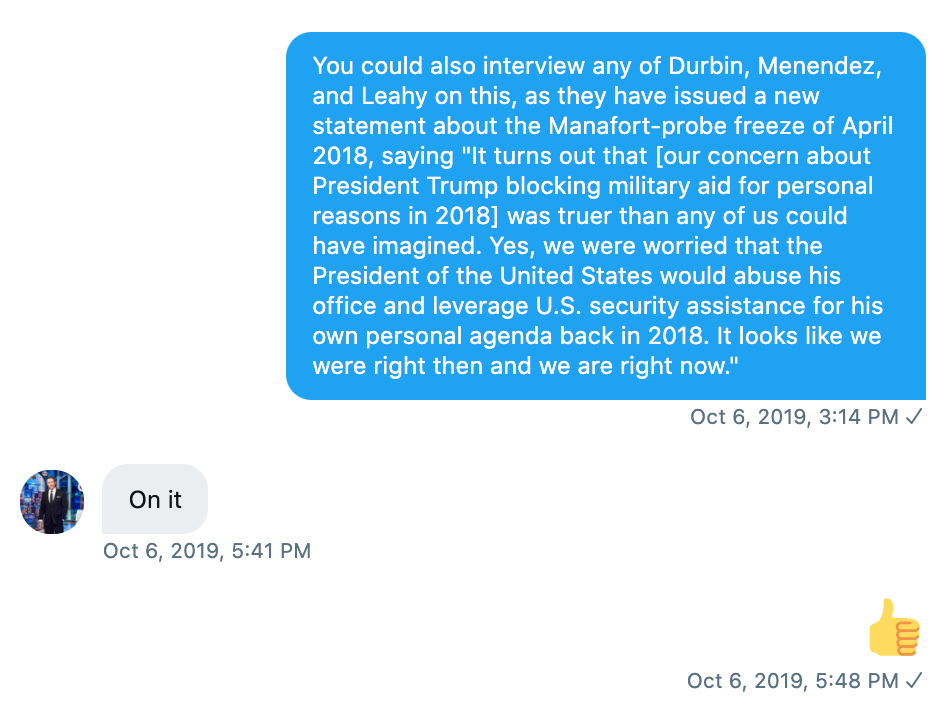
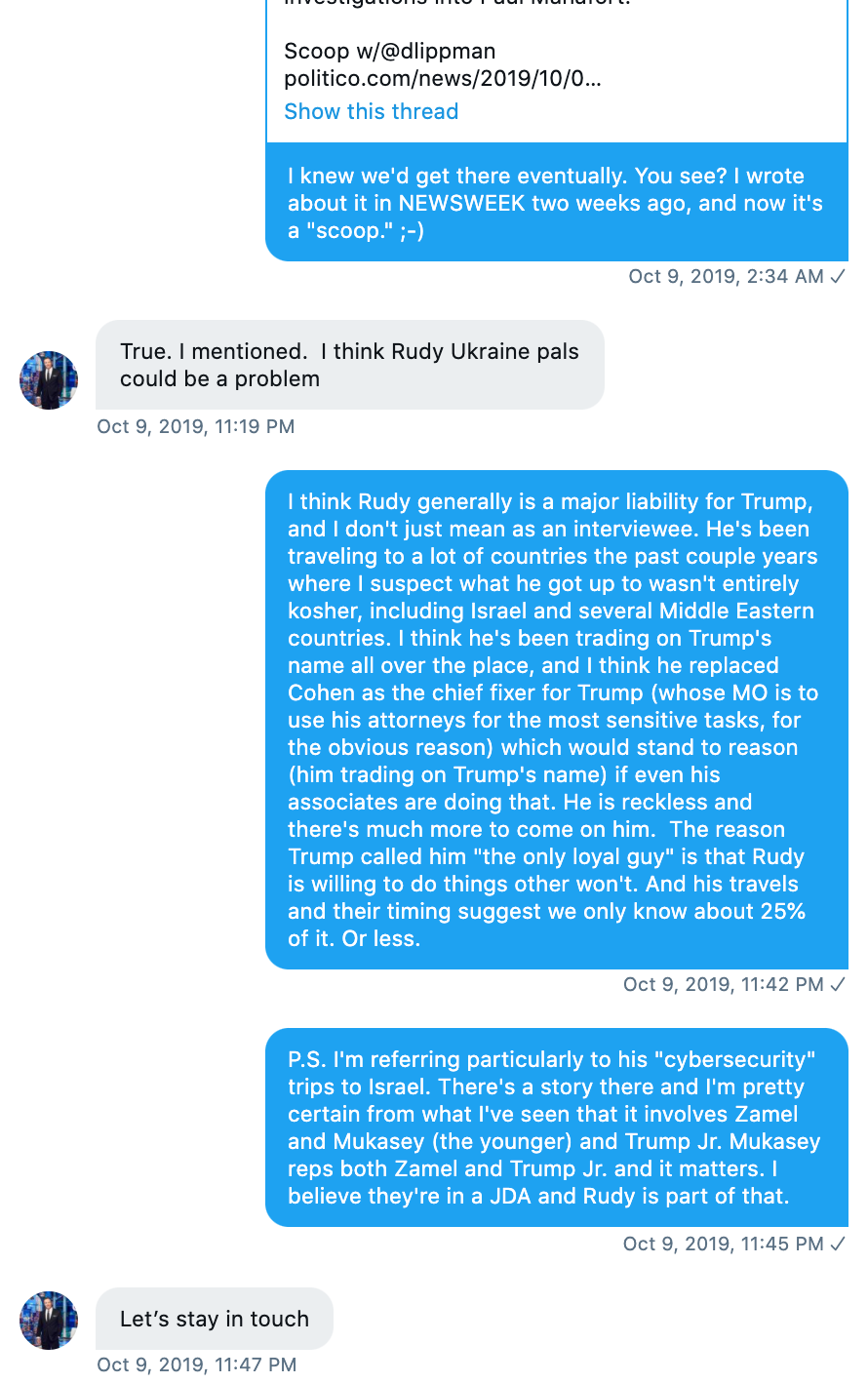
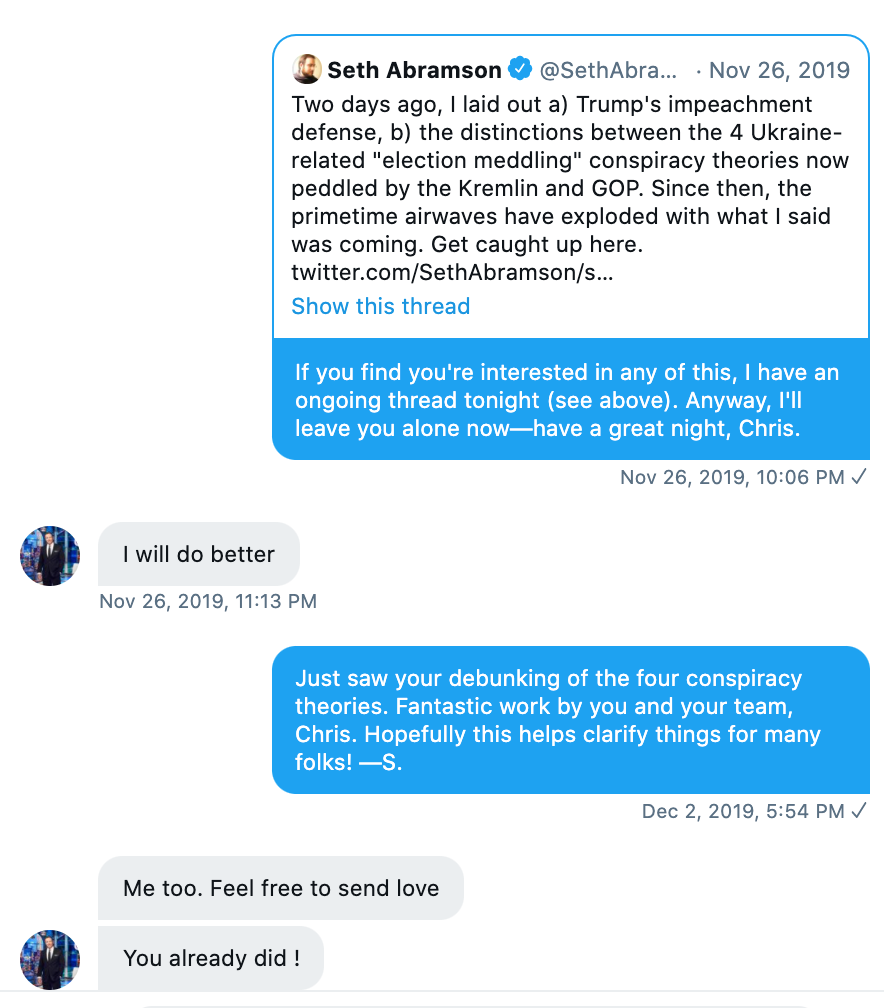
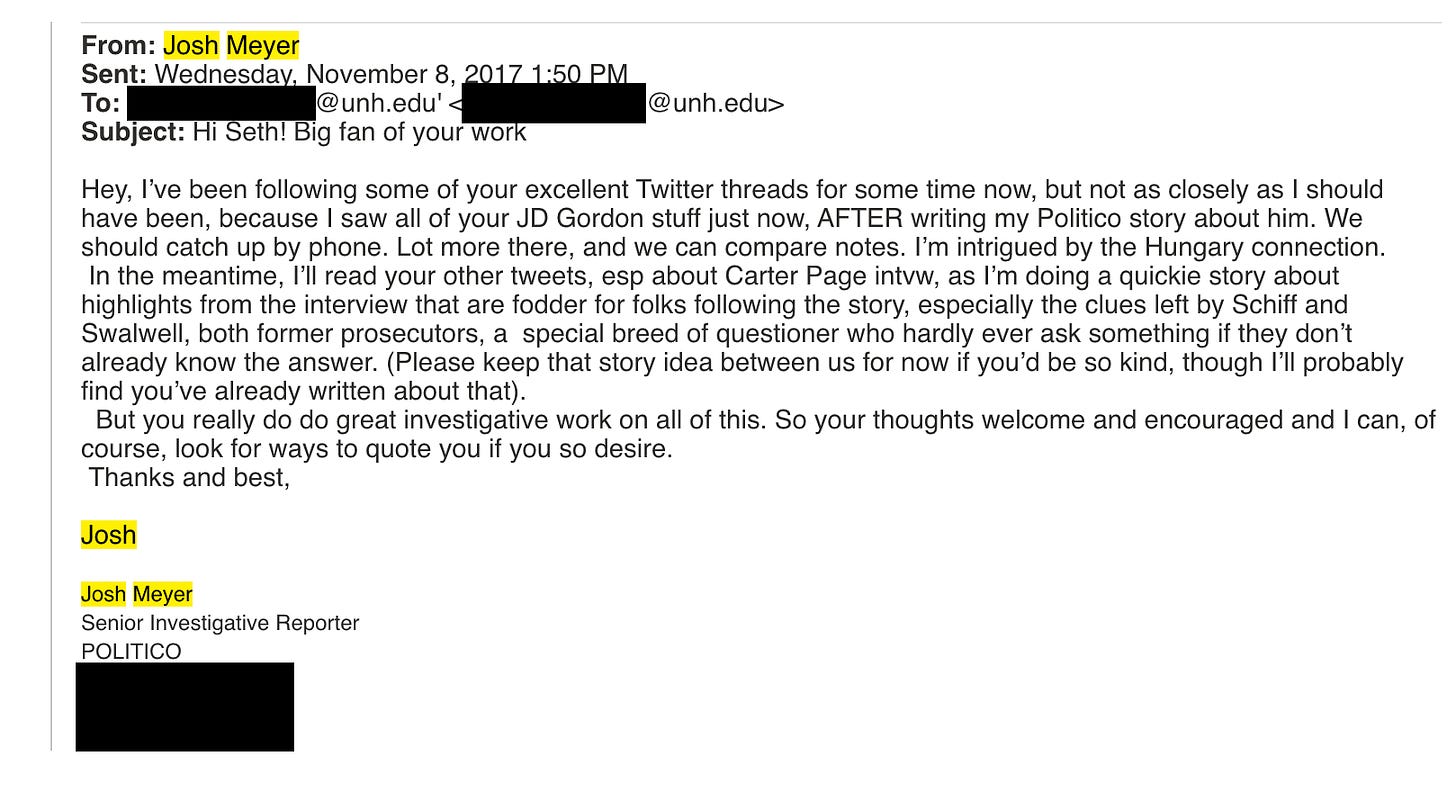


When I read your four conspiracies on Twitter and then saw them on Cuomo's show, I had a feeling you were in contact with them or Cuomo was reading your feed. I remember in the past telling Cuomo (via Tweet) you needed to be on his show and he would not regret having you visit. Thank you again Seth for all you do and I have found my journalist to follow and support (you).
Wow. I am appalled by L.L.'s and CJR's lack of ethics, fact-checking on this piece and their refusal to delete it from their site, or publish corrections/apologies, and extremely disappointed with Cuomo. I am so very sorry this has happened to you!
I have to admit, this whole series was difficult to read as I've experienced what you've experienced in two different instances and scenarios; to a lesser extent, to be sure, (although I almost lost my roommate, best friend, and my job due to someone's stalking and lies).
Please know your work, time, perspective, honesty, and integrity are appreciated. And, I hope this 4-part essay was a cathartic exercise for you. Great writing, as usual. Well done! Oh, and a lawsuit, (if you choose to follow-through with one) will be painful but, hopefully, worth it. Do whatever you need to do. Standing up for the truth and for yourself is always worth it!
Sending you and your wife protective, healing, and positive wishes. Hang in there, Seth!